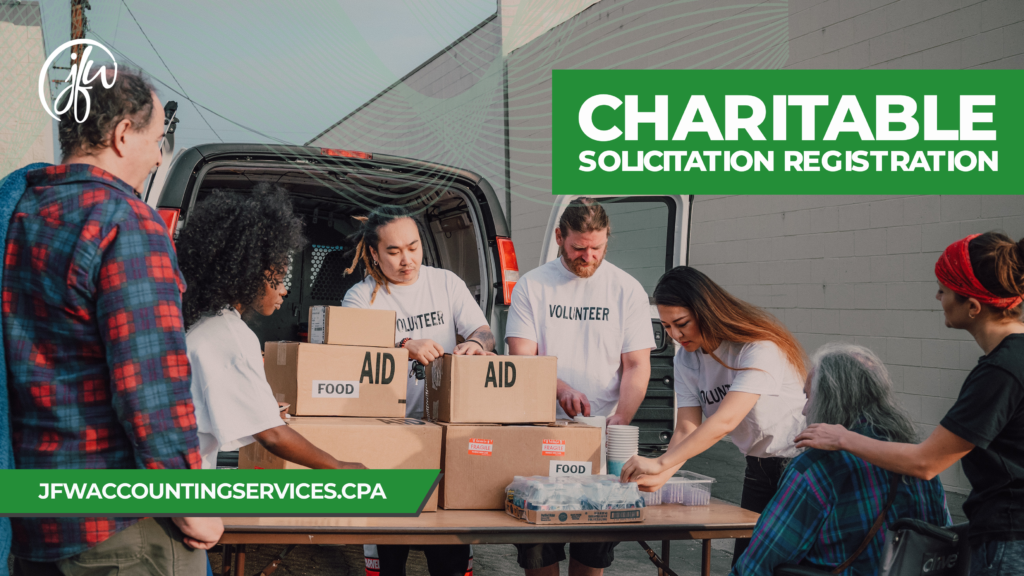Nonprofit organizations operate on the concept of accountability. While the tax-exempt status that 501(c) organizations and other nonprofits receive come from the Internal Revenue Service (IRS), an organization’s nonprofit status is granted by the state in which the entity is organized. The state is also responsible for governing solicitation registrations and requirements.
In this article, we look at the state charitable solicitation registration requirements and share some tips for staying compliant with the requirements in your organization’s state.
What Is Charitable Solicitation Registration And Why Is It Important?
Charitable solicitation registration is a requirement at the state level for any charitable organization that receives donations or participates in fundraising. Since a large portion of a nonprofit’s income typically comes from fundraising, it is very important to understand the state requirements before soliciting funds.
The state legislation regarding solicitation is in place to protect both donors and charitable organizations. By registering with the state, the public has access to information about the nonprofit. Better informed donors may mean larger or more frequent donations to the organization. Allowing current and potential donors to review the organization’s state registration before donating also protects the organization down the road from legal issues or bad publicity.
There are consequences for failing to register to solicit donations which can lead to costly penalties and damage to the nonprofit’s public perception. Depending on the state, failing to register before soliciting donations or missing deadlines on renewal applications may lead to the following consequences:
- Civil or criminal action against the organization’s Board Members
- Fines and late fees
- Loss of tax-exempt status
- Revocation of the right to solicit funds in the upcoming year
- Expulsion from grant opportunities
Which Organizations Are Required To Register For Charitable Solicitation?
As of today, charitable solicitations must be registered in 41 states in the U.S. and the District of Columbia. This requirement applies to all types of fundraising activities including:
- In-person events
- Direct mail solicitations
- Email campaigns
- Phone calls asking for donations
- Online fundraising
Understanding which state or states to register in can be confusing for many new and established charitable organizations. Best practice states that a nonprofit should first complete the registration in the state in which it was incorporated. Beyond that, charitable solicitation should be completed in any state where the organization has a physical location or makes regular visits for fundraising or charitable work.
Collecting contributions through websites further complicates the process. The legislation requires that registration is completed before soliciting funds, so many organizations choose to operate on a “better safe than sorry” principle, registering nationwide or in all states where donations are expected from residents.
Exemptions From State Charitable Solicitation Registration
Not all types of nonprofit organizations are required to register. Just like specific requirements, exemptions are governed at the state level, but most states consider the following organizations as exempt:
- Religious organizations, like Churches
- Educational organizations, like Schools
- Self-funded organizations, meaning that all contributions come from the nonprofit’s members
- Organizations that do not collect a minimum donated amount each year
Despite the exemption, in some states, even the organizations described above must apply to be exempt from the registration, so be sure to check with a nonprofit accounting expert or your state’s nonprofit legislation before assuming exemption
What Is Required To Register For State Charitable Solicitation?
Charitable solicitation is governed by the Secretary of State or the State Attorney General and can usually be done online or via paper forms. Each state has its own specific requirements for compliance with the charitable solicitation registrations when it comes to which forms and what information is required to complete registration. The following is a list of common forms required for registration:
- IRS Form 990
- Organization’s by-laws
- Articles of Incorporation
- Tax-exempt determination
- Financial statements
Check the Attorney General or the Secretary of State’s websites in the state that your nonprofit is registering for a more complete list of requirements. Also, some states, require that an organization complete a renewal application each year.
Tips For Staying Compliant
The state charitable solicitation requirements are not in place to intimidate nonprofit leaders, their purpose is to protect. Browse through the following tips for success and don’t be afraid to reach out if you need help.
- Have financial statements and a copy of the most recent Form 990 on hand before registering.
- Check your state’s governing website to be sure you’re meeting the specific requirements for your organization.
- Plan for registration costs by learning what they are for your state.
- If your nonprofit collects donations from multiple states, consider using a service to register your organization nationwide
- If you use an accounting service to complete Form 990, they can often complete this registration on behalf of the organization or prepare all of the necessary documents for registration.
- Take note of renewal requirements.
- Some states require more than one signature on registration forms, so include all applicable Board Members.
Bottom Line
The state charitable solicitation registration requirements are in place to protect donors, nonprofits, and the government. There are many great resources available to help you navigate the requirements of solicitation registration. Check out the IRS’s website, your state’s government page, or with JFW Accounting Services to help your nonprofit prepare for full compliance.

Jo-Anne Williams Barnes, is a Certified Public Accountant (CPA) and Chartered Global Management Accountant (CGMA) holding a Master’s of Science in Accounting (MSA) and a Master’s in Business Administration (MBA). Additionally, she holds a Bachelor of Science (BS) in Accounting from the University of Baltimore and is a seasoned accounting professional with several years of experience in the field of managing financial records for non-profits, small, medium, and large businesses. Jo-Anne is a certified Sage Intacct Accounting and Implementation Specialist, a certified QuickBooks ProAdvisor, an AICPA Not-for-Profit Certificate II holder, and Standard for Excellence Licensed Consultant. Additionally, Jo-Anne is a member of American Institute of Certified Public Accountant (AICPA), Maryland Association of Certified Public Accountants (MACPA), and Greater Washington Society of Certified Public Accountants (GWSCPA) where she continues to keep abreast on the latest industry trends and changes.

